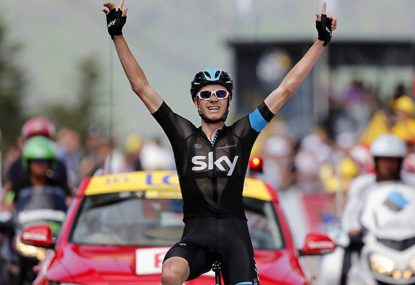'I've just won a stage of the Tour de France, mate!': Hindley grabs yellow jersey as Aussie blows Tour apart
Australia's Jai Hindley has said he is "lost for words" after a shock stage victory at the Tour de France earned him the leader's…

Since the 2016 Tour de France ended, I have seen numerous comments proclaiming that this year’s race for the Maillot Jaune was boring.
When a rider wins a race by over four minutes, it is an easy assumption to make that the man at the top had it easy.
However, this was far from a boring Tour.
You may be now asking yourself the question, well surely 2015 was a closer general classification fight, with Colombian Nairo Quintana finishing only one minute and 12 seconds off the dominant Chris Froome.
Fair point, the time gap is smaller. However, it is the way that both races evolved over the three weeks that is the key area of concern, not the end result in Paris.
First rest day GC congestion
At the end of Stage 9, the first rest day of the Tour, and at the completion of the Pyrenees, Chris Froome had a slender lead of only 16 seconds to fellow Brit Adam Yates, with key rival from 2015 Quintana only 23 seconds adrift.
This included Froome surprising his counterparts by descending away on the fairly uncomplicated descent off the Peyresourde to win Stage 8. If it was not for this move, we would have seen Yates in the leader’s jersey come the end of the Pyrenees.
In 2015, the first rest day occurred before the Pyrenees had even been climbed, however Froome still had a lead of over a minute to Alberto Contador, and nearly two on Quintana, mainly due to the cobbles of Stage 4. Froome went on to win the first Pyrenean battle, on Stage 10, taking a minute on Quintana to leave him over three minutes behind after the first mountain day.
The race was effectively over after the first key mountain stage of the Tour.
A year earlier, in 2014, both Contador and Froome had crashed out before the race’s first rest day, which allowed Vincenzo Nibali a two-and-a-half minute advantage over Richie Porte.
Only 2010 can rival this year’s Tour in being tight near the top after the first rest day, as Cadel Evans had a 20-second lead over Andy Schleck, with all the other contenders a further minute back.
In 2016, the final top ten finishers were all inside two minutes and 30 seconds by the first rest day. If you take out Richie Porte, who suffered from a late race puncture on Stage 2, that figure would drop to one minute and 16 seconds, with eventual tenth-place finisher Roman Kreuziger.
This year the top ten were covered by just over seven minutes from winner Froome. In 2015, 2013 and 2012, the gap to the tenth rider on GC in Paris was over 17 minutes, while in 2014 it was over 20 minutes.
2011 comes closest in the most recent history to having such a close top ten, with tenth place rider Pierre Roland just over ten minutes back.
Part 2 will examine how Team Sky’s tactics affected our perception of the race.